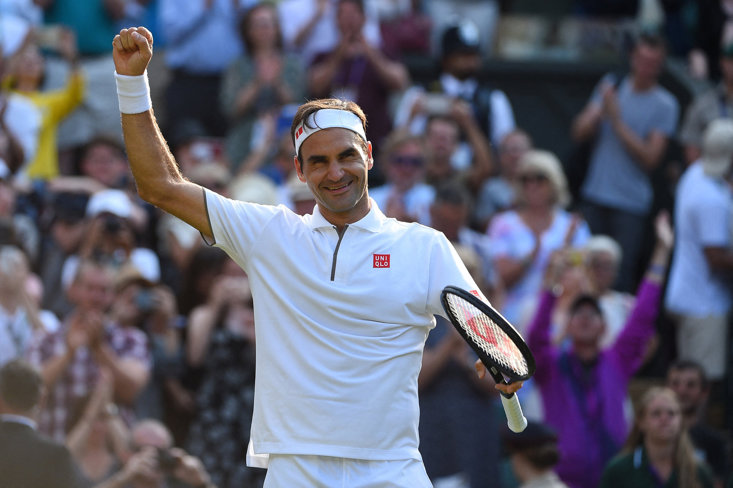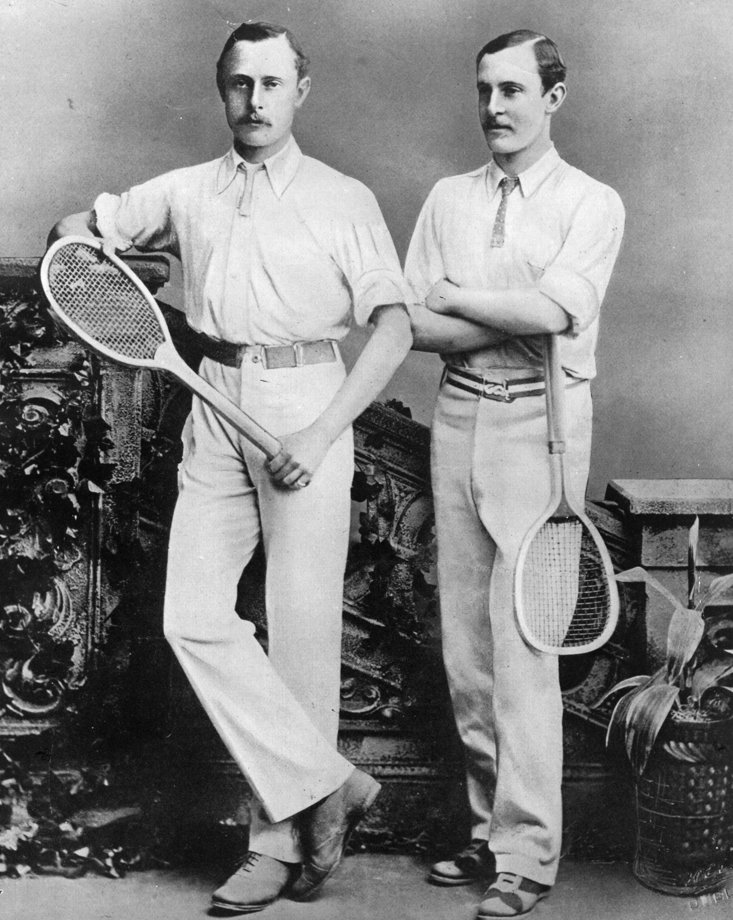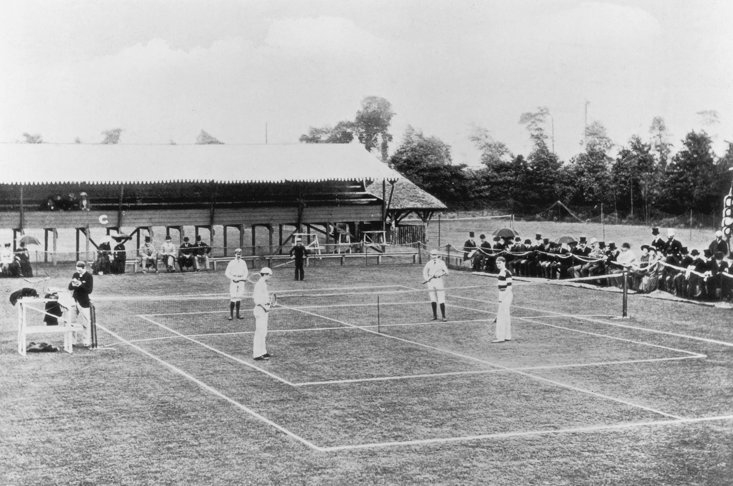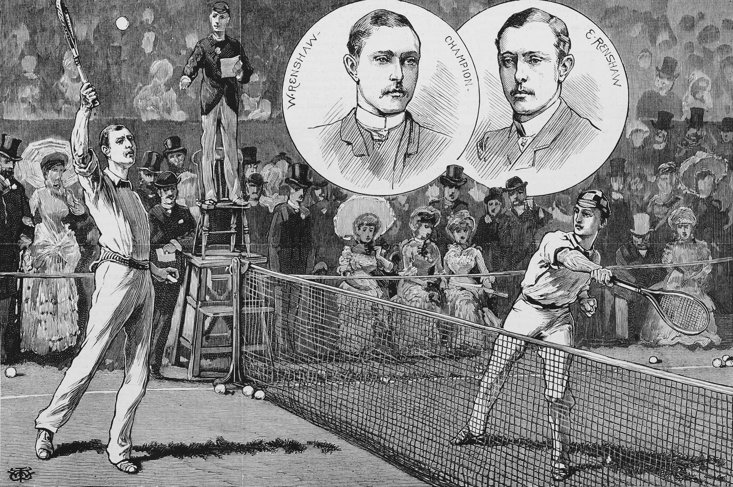Starter for ten: which male tennis player has won the most consecutive men’s singles titles at Wimbledon?
Federer? No, Rafael Nadal put the blockers on the Swiss besting Borg’s five-in-a-row, in 2008. Sampras? Unfortunately Pete’s astonishing seven at the All-England club between ‘93 and 2000 was cruelly interrupted by Richard Krajicek in 1996.

There’s been a few decent attempts in both the amateur and professional era, Perry’s pre-WWII hattrick springs to mind. But no, to find the recipient of accolade, journey back 130 years to when the oldest tennis competition in the world was in its baptism.
The sport exploded with the arrival of Ernest and William Renshaw on the scene, twin brothers born to a widowed mother in Royal Leamington Spa in 1861, and it is Willie who still holds the achievement for a record six straight gentlemen’s singles titles at The Championships.
Out of the Britons who dominated the event in its first 30 years, it is the Renshaw Twins who remain the most fundamental to the burgeoning reputation of the event after its initialisation. Their impact on the greater interest in the game in their heyday was subsequently dubbed the 'Renshaw Rush'. Followed devotedly by fans and asked for autographs, they were the first superstars of the sport.
But there can only be one winner of Wimbledon. And the two brothers would find that the greatest adversity would be each other.

Shortly after their birth, the Renshaw family first moved to Cheltenham, building a backyard tennis court, then to Kensington, London. With a noticeable lack of academic strength, the Renshaw boys’ sporting prowess had always been evident. As biographer Mark Ryan researched, “on Sports Day in 1874, they ran a dead heat in the 350 yards race, finishing far ahead of the other competitors. In the 200 yards Ernest came first, while William came third. They were given a heavy handicap in the steeplechase, but still easily outran everyone else, with Ernest finishing first and William second.”
Five years after the rules of tennis began to be certified, and the world’s first lawn tennis club was developed, in 1874, (coincidentally, also in Leamington) and two years after Spencer William Gore became the first Wimbledon Gentlemen’s Singles winner in 1877, the Renshaws entered the competition.
However, their intent was purely to observe. With William defeating ‘79 finalist and later convicted murderer Vere Goold in a Cheltenham open tournament, the brothers would first grace the All-England Club with their presence in 1880. Their first performances reportedly left a lot to be desired.
In his book “Lawn Tennis Recollections” (1898), Herbert Chipp, the first secretary of the British Lawn Tennis Association, recalled “It was at Wimbledon, in the 1880 Championship, that I first saw the Renshaws. Rumours had reached those who, like myself, could at that time scarcely call themselves lawn tennis players, of the wonderful doings of two Cheltenham boys, and curiosity to obtain ocular proof of their skill was aroused in me, for one. I had not then seen any first-class form, and I decided that I would journey down to Wimbledon to gratify my desire to know what a player in the front rank could do.
“I must frankly confess to a feeling of disappointment as the result of my journey. The performance was by a long way not so wonderful as I had imagined it would be.”
William exited in the second round, Ernest faring slightly better by making it to the third. It was only the following year with a 37minute straight sets defeat of reigning champion the Reverend John Thorneycroft Hartley (of no great surprise, the only clergyman to win Wimbledon) that William first took the main prize. On July 13 1881 Renshaw dropped just two sets to Hartley for what would be the first of a total of seven Wimbledon singles titles.

The Renshaws operated on their respective halves of the court as territory they had been sworn to protect. The ball became the enemy, the object they’d be determined to get rid of, and its direction forcing the opponent into making mistakes. Defence became attack, and vice versa.
What had been a graceful but fairly mundane game, the Renshaws transformed with power and verve and serve to tennis. They advocated the overarm, volleys, and such was their propensity for the smash, the technique was known as the ‘Renshaw Smash.’
As the year that they entered the national competition, the inaugural Wimbledon champion Gore would later write “In 1880 ended the frivolous era of lawn tennis.” Similarly, the (admittedly not entirely unbiased) Leamington History Group credit the Renshaws for ‘revolutionising the game’: “Without them, lawn tennis might never have been much more than an elegant pass-time for garden parties.”
Their effect on Doubles was arguably even greater, pioneering the tactical manoeuvre of net play and a swift serve-and-volley playing style became known as the “Renshaw Rush”.
Before the duo’s advent, the object of championship tennis had been the honour of defence, to avoid a loss. The Renshaws played to win. And win hard. Therein lies the subtle difference.
And then came the first meeting in the marquee final. The brothers staring at each other from across the net. After William Renshaw’s first win, in 1882 he was given the unenviable task to defend his Wimbledon title against his best enemy: his twin.

Whereas William had demolished Hartley in 37 blistering minutes, Renshaw v Renshaw produce a five-set five-star thriller, a 6–1, 2–6, 4–6, 6–2, 6–2 scoreline in William’s eventual favour after coming back from two sets down, with The London Standard match report describing the match as an occasion in which "the brothers Renshaw gave perhaps the finest exposition of the game of lawn tennis ever seen at Wimbledon."
It was the first of a trilogy of final meetings between ‘82 and ‘89, with William the victor in both of those other meetings. There was rivalry between brothers but no evident animosity. The two together would win the All-England doubles seven times - Oxford in 1880/81, Wimbledon 1884 to 1886, and again in 1888 to 89, and Ernest Renshaw would later win his only singles title in 1888, a year in which William didn’t compete due to tennis elbow.
That same year William was elected the first President of the British Lawn Tennis Association and duly returned to Wimbledon in 1889 beating the incumbent champion for his seventh singles’ title at the tournament.
The defeated was, once again, Ernest.
The last appearance of a Renshaw at Wimbledon was in 1893, when the twins were drawn to play each other in the first round. Willie withdrew in favour of his younger brother, who lost in the subsequent round. When William left the All-England Club, he had lost just three matches in his Wimbledon career.
Both brothers were unmarried when they died, each at an extremely young age. Ernest Renshaw was only 38 when he died before even seeing out the century, on 2 September 1899, at The Grange, Waltham St Lawrence, near Twyford, Berkshire, after the ingestion of carbolic acid. Described as ‘a gentleman of independent means’, Willie Renshaw - the older twin by 15 minutes - died just under five years later aged 43 at Swanage, Dorset, on 12 August 1904, following epileptic convulsions.
There may have been greater, more talented champions in the procession that have blessed Wimbledon in the almost century and a half since the Renshaw Brothers’ dominance, but few can claim to have had either such a long-standing impact and legacy as William and Ernest, the towering Twins of Tennis.